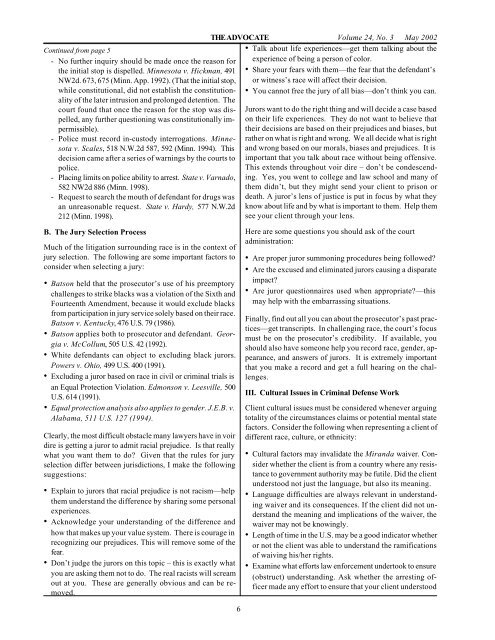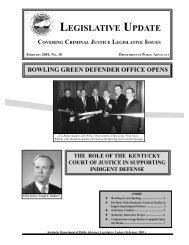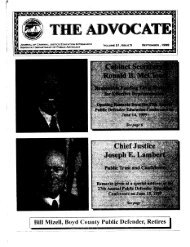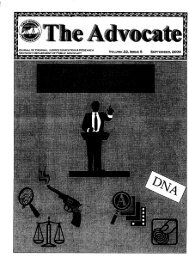May 2002 - Department of Public Advocacy
May 2002 - Department of Public Advocacy
May 2002 - Department of Public Advocacy
Create successful ePaper yourself
Turn your PDF publications into a flip-book with our unique Google optimized e-Paper software.
Continued from page 5<br />
- No further inquiry should be made once the reason for<br />
the initial stop is dispelled. Minnesota v. Hickman, 491<br />
NW2d. 673, 675 (Minn. App. 1992). (That the initial stop,<br />
while constitutional, did not establish the constitutionality<br />
<strong>of</strong> the later intrusion and prolonged detention. The<br />
court found that once the reason for the stop was dispelled,<br />
any further questioning was constitutionally impermissible).<br />
- Police must record in-custody interrogations. Minnesota<br />
v. Scales, 518 N.W.2d 587, 592 (Minn. 1994). This<br />
decision came after a series <strong>of</strong> warnings by the courts to<br />
police.<br />
- Placing limits on police ability to arrest. State v. Varnado,<br />
582 NW2d 886 (Minn. 1998).<br />
- Request to search the mouth <strong>of</strong> defendant for drugs was<br />
an unreasonable request. State v. Hardy, 577 N.W.2d<br />
212 (Minn. 1998).<br />
B. The Jury Selection Process<br />
Much <strong>of</strong> the litigation surrounding race is in the context <strong>of</strong><br />
jury selection. The following are some important factors to<br />
consider when selecting a jury:<br />
• Batson held that the prosecutor’s use <strong>of</strong> his preemptory<br />
challenges to strike blacks was a violation <strong>of</strong> the Sixth and<br />
Fourteenth Amendment, because it would exclude blacks<br />
from participation in jury service solely based on their race.<br />
Batson v. Kentucky, 476 U.S. 79 (1986).<br />
• Batson applies both to prosecutor and defendant. Georgia<br />
v. McCollum, 505 U.S. 42 (1992).<br />
• White defendants can object to excluding black jurors.<br />
Powers v. Ohio, 499 U.S. 400 (1991).<br />
• Excluding a juror based on race in civil or criminal trials is<br />
an Equal Protection Violation. Edmonson v. Leesville, 500<br />
U.S. 614 (1991).<br />
• Equal protection analysis also applies to gender. J.E.B. v.<br />
Alabama, 511 U.S. 127 (1994).<br />
Clearly, the most difficult obstacle many lawyers have in voir<br />
dire is getting a juror to admit racial prejudice. Is that really<br />
what you want them to do Given that the rules for jury<br />
selection differ between jurisdictions, I make the following<br />
suggestions:<br />
• Explain to jurors that racial prejudice is not racism—help<br />
them understand the difference by sharing some personal<br />
experiences.<br />
• Acknowledge your understanding <strong>of</strong> the difference and<br />
how that makes up your value system. There is courage in<br />
recognizing our prejudices. This will remove some <strong>of</strong> the<br />
fear.<br />
• Don’t judge the jurors on this topic – this is exactly what<br />
you are asking them not to do. The real racists will scream<br />
out at you. These are generally obvious and can be removed.<br />
THE ADVOCATE Volume 24, No. 3 <strong>May</strong> <strong>2002</strong><br />
6<br />
• Talk about life experiences—get them talking about the<br />
experience <strong>of</strong> being a person <strong>of</strong> color.<br />
• Share your fears with them—the fear that the defendant’s<br />
or witness’s race will affect their decision.<br />
• You cannot free the jury <strong>of</strong> all bias—don’t think you can.<br />
Jurors want to do the right thing and will decide a case based<br />
on their life experiences. They do not want to believe that<br />
their decisions are based on their prejudices and biases, but<br />
rather on what is right and wrong. We all decide what is right<br />
and wrong based on our morals, biases and prejudices. It is<br />
important that you talk about race without being <strong>of</strong>fensive.<br />
This extends throughout voir dire – don’t be condescending.<br />
Yes, you went to college and law school and many <strong>of</strong><br />
them didn’t, but they might send your client to prison or<br />
death. A juror’s lens <strong>of</strong> justice is put in focus by what they<br />
know about life and by what is important to them. Help them<br />
see your client through your lens.<br />
Here are some questions you should ask <strong>of</strong> the court<br />
administration:<br />
• Are proper juror summoning procedures being followed<br />
• Are the excused and eliminated jurors causing a disparate<br />
impact<br />
• Are juror questionnaires used when appropriate—this<br />
may help with the embarrassing situations.<br />
Finally, find out all you can about the prosecutor’s past practices—get<br />
transcripts. In challenging race, the court’s focus<br />
must be on the prosecutor’s credibility. If available, you<br />
should also have someone help you record race, gender, appearance,<br />
and answers <strong>of</strong> jurors. It is extremely important<br />
that you make a record and get a full hearing on the challenges.<br />
III. Cultural Issues in Criminal Defense Work<br />
Client cultural issues must be considered whenever arguing<br />
totality <strong>of</strong> the circumstances claims or potential mental state<br />
factors. Consider the following when representing a client <strong>of</strong><br />
different race, culture, or ethnicity:<br />
• Cultural factors may invalidate the Miranda waiver. Consider<br />
whether the client is from a country where any resistance<br />
to government authority may be futile. Did the client<br />
understood not just the language, but also its meaning.<br />
• Language difficulties are always relevant in understanding<br />
waiver and its consequences. If the client did not understand<br />
the meaning and implications <strong>of</strong> the waiver, the<br />
waiver may not be knowingly.<br />
• Length <strong>of</strong> time in the U.S. may be a good indicator whether<br />
or not the client was able to understand the ramifications<br />
<strong>of</strong> waiving his/her rights.<br />
• Examine what efforts law enforcement undertook to ensure<br />
(obstruct) understanding. Ask whether the arresting <strong>of</strong>ficer<br />
made any effort to ensure that your client understood








